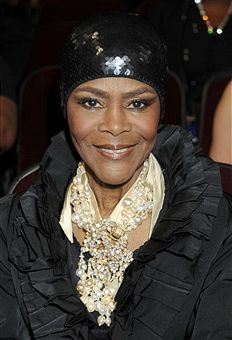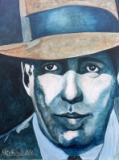Harlem Renaissance
In the early 1920's there was a movement called the "Negro" or "Harlem Renaissance". This resurgence of literature, knowledge, and the arts coming out of New York was powerful.

Cicely Tyson is one of America’s most respected dramatic actresses. A successful stage actress, Tyson is also known for appearances in the film Sounder and the television specials The Autobiography of Miss Jane Pittman and Roots. Tyson was honored by the Congress of Racial Equality, the National Association for the Advancement of Colored People, and the National Council of Negro Women. In 1977 she was inducted into the Black Filmmakers Hall of Fame.
Cicily Tyson was born in 1933 and raised in Harlem, New York, the daughter of Theodosia, a domestic, and William Tyson, a pushcart operator. Her parents were immigrants from the island of Nevis of the Federation of Saint Kitts and Nevis in the West Indies; her father arrived in New York City at the age of 21 and was processed at Ellis Island on August 4, 1919.
After working as a secretary Cicely Tyson launched her career as a model. Tyson owes her career to a good haircut. In a beauty salon, her hairdresser asked Tyson to model at a hairstyle show. At the hair show, she was spotted by a photographer from Ebony magazine, and began her successful career as a model. Cicely Tyson appeared on the covers of many Black American publications and some mainstream magazines such as Vogue and Harper’s Bazaar. Within a few years, she was among the most successful black models in America. However, she wasn’t completely happy with her modeling career. When asked by a Time magazine reporter about it, Tyson stated, “I felt like a machine.”
Cicely Tyson decided to pursue an acting career after she was asked to participate in a movie named The Spectrum that was never released. She enjoyed acting and decided to enroll in acting school. While learning her craft, she also began performing in Off-Broadway stage productions.
Tyson got her first real break in 1963, playing a secretary to George C. Scott on the TV series East Side/West Side, and in 1966 signed on with the daytime soap The Guiding Light. That same year, she made her credited screen debut starring opposite Sammy Davis Jr. in the drama A Man Called Adam.
Her success led to more television roles. She became a frequent guest star on numerous 1960s and 1970s television programs such as I Spy, Naked City, The Nurses and The Bill Cosby Show.
Because she was committed to presenting only positive images of black women, Tyson did not have steady work in film and television. Her next notable role was as Rebecca Morgan in the popular and critically acclaimed film Sounder (1972), for which she received an Academy Award nomination for best actress. In 1974 she appeared in perhaps her best-known role, that of the title character in the television drama The Autobiography of Miss Jane Pittman. Her performance as the 110-year-old former slave whose life is depicted up through the Civil Rights Movement of the 1960s won Tyson two Emmy Awards. She became the first African-American actress to win the Best Actress Emmy Award.
Other acclaimed television roles included Roots, King, in which she portrayed Coretta Scott King, The Marva Collins Story, When No One Would Listen, and Oldest Living Confederate Widow Tells All for which she received her third Emmy Award.
In 1983, Tyson appeared on Broadway in a production of The Corn Is Green which was poorly reviewed and closed after only two weeks. She was fired when she took a night off to attend a tribute to her then-husband, jazz musician Miles Davis. Tyson sued the producers, maintaining that she was entitled to payment in full as stipulated in her contract, about $750,000. The case and appeals took 15 years, but Tyson won.
In her 1994-1995 television series Sweet Justice, Cicily Tyson portrayed a feisty, unorthodox Southern attorney named Carrie Grace Battle, a character she shaped by consulting with and shadowing the legendary Washington, D.C. civil rights and criminal defense lawyer Dovey Johnson Roundtree. In 2005, Tyson co-starred in the movies Because of Winn-Dixie and Diary of a Mad Black Woman. The same year she was honored by Oprah Winfrey at her Legends Ball.
In 1997, Tyson again donned old woman's makeup to offer a delightfully crotchety version of Charles Dickens' Scrooge in the 1997 USA Network original production Ms. Scrooge. Two years later, she had another television success, and another Emmy nomination, with A Lesson Before Dying, a drama set in the 1940s about a black man sentenced to death for a murder he did not commit
Tyson was honored by the Congress of Racial Equality, the National Association for the Advancement of Colored People, and the National Council of Negro Women. In 1977 she was inducted into the Black Filmmakers Hall of Fame.
Don't miss a single page. Find everything you need on our complete sitemap directory.
Listen or read the top speeches from African Americans. Read more
Read about the great African Americans who fought in wars. Read more
African Americans invented many of the things we use today. Read more
Thin jazz, think art, think of great actors and find them here. Read more
Follow the history of Black Americans from slave ships to the presidency. Read more
Olympic winners, MVPS of every sport, and people who broke the color barrier. Read more
These men and women risked and sometimes lost their life to fight for the cause. Read more
Meet the people who worked to change the system from the inside. Read more

Visit my RedBubble page and use Michael Arnold Art to create greeting cards, T-shirts, mugs, and more.

The variety and impressive numbers of mammals, birds and marine wildlife in Alaska draw visitors from all over the world. For some travelers, Alaska is wilderness, at least compared to what they may know from back home. The pristine wilderness of Alaska is, perhaps, the last vestige of thriving populations of North American wildlife. Where else can you see polar bears, bald eagles, blue and humpbacked whales, gray wolves, grizzly bears, orcas, lynx, moose, and hundreds of other rare and endangered species in their original and undisturbed natural habitats?

Enjoy our website filled with original signed acrylic paintings by award winning Artist Michael Arnold. Located in Citrus County Florida, Michael Arnold is a the editor at the Citrus County Chronicle. When he's not busy being an editor, he is an avid artist who enjoys painting in a variety of styles. We hope you take the time to click on each image to see a larger view and to learn what the artist, Michael Arnold has to say about his paintings.

As dog owners and people who care deeply for animals and wildlife, we wanted our Dog Encyclopedia to be a website that could empower pet owners to create the most positive, loving environment for their dogs. Dog Encyclopedia realizes that owning a dog is like adding a new member to your family.

Floridian Nature has everything your are looking for in Florida nature. The wildlife of Florida is rich and varied, yet most of us are familiar with only a dozen or so species: the "well known endangered species such as manatees and panthers; those, like raccoons and squirrels, that have adapted to urban environments; the frightening alligators and black bears; and those like the armadillo who can't seem to cross the road. Yet they are just a few of the many animal species found in Florida.
